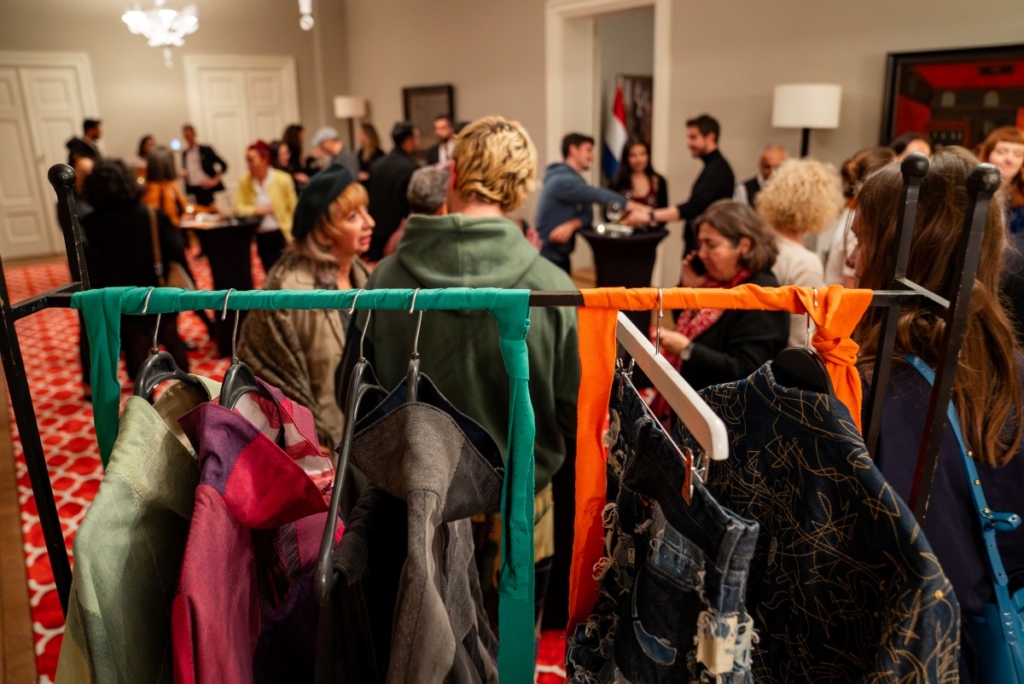Asırlık Türkiye-Hollanda dostluğu “Ortak Miras ve Döngüsel Tekstil Projesi” ile taçlandırıldı. Hollanda ve Türkiye’nin kültürel bağları, döngüsel tekstil yaklaşımıyla yeniden yorumlayan proje ile kadim dostluk pek çok alanda gelecekte pekiştirilerek sürdürülecek.









Hollanda Krallığı İstanbul Başkonsolosluğu, 28-29 Kasım 2024 tarihlerinde, Türkiye ve Hollanda’nın kültürel mirasını döngüsel tekstil perspektifinden ele alan özel bir etkinliğe ev sahipliği yaptı. “Ortak Miras ve Döngüsel Tekstil Projesi”, iki ülke arasında sürdürülebilir iş birliklerini güçlendirmek, kültürel bağları pekiştirmek ve döngüsel ekonomi alanında yenilikçi çözümler geliştirmek amacıyla düzenlendi.
Etkinlik, 100 yıllık Türkiye-Hollanda dostluğunun bir parçası olarak, tekstil sektöründe sürdürülebilirlik odaklı yaklaşımları desteklerken aynı zamanda yaratıcı tasarımların kültürel mirasla nasıl buluşabileceğini gözler önüne serdi. This is Mana Sosyal Girisimi’nin kolaylaştırıcılığında hayata geçirilen program, akademisyenleri, sektör profesyonellerini ve tasarım öğrencilerini bir araya getirerek bilgi ve deneyim paylaşımına zemin hazırladı.
Etkinlikte Öne Çıkan Konular
Etkinliğin açılışında, Hollanda Krallığı İstanbul Başkonsolosu Arjen Uijterlinde’nin ardından iki özel keynote konuşması gerçekleştirildi. Tilburg Tekstil Müzesi Eski Direktörü ve danışman Errol van de Werdt, tekstil mirası ve döngüsel ekonomi ilişkisini ele alırken, Human Innovation Designer Arzu Kaprol ise insan odaklı yenilikçi tasarımlar ve sürdürülebilirlik üzerine ilham verici bir konuşma yaptı.
Tekstil Mirası ve Döngüsellik Pratikleri: Hollanda ve Türkiye konulu ilk panelde, Hollanda ve Türkiye’nin tekstil tarihine dair önemli bilgiler paylaşılırken, her iki ülkede döngüsel ekonomiye yönelik güncel yaklaşımlar ele alındı. Panelin moderatörlüğünü İzmir Ekonomi Üniversitesi’nden Şölen Kipoz üstlendi. Katılımcılar arasında New Order of Fashion’dan Helen Milne, Vogue Türkiye’den Melida Tüzünoğlu ve Huner ve Ferah markalarinin kurucusu Hüner Aldemir yer aldı.
Döngüsel Ekonominin Tekstil Sektörüne Uygulanışı ve Gelecekteki İşbirliği Fırsatları panelinde ise, tekstil sektöründe döngüsel ekonomiye yönelik öncü yaklaşımlar tartışıldı ve Türkiye ile Hollanda arasında gelecekteki işbirliği fırsatları masaya yatırıldı. Panelistler arasında House of Denim’den Mariette Hoitink, İTKİB’ten Vakur Besim Özek ve Eindhoven Design Academy’den Nicoline Dorsman yer aldı.
Proje Online Eğitim Programı ile Başladı
Etkinlik öncesinde, Kasım ayının ikinci haftasında düzenlenen çevrim içi eğitim programı, döngüsel ekonomi uygulamaları, yaratıcı ekonomi, sorumlu tasarım yaklaşımları ve yerel perspektifler üzerine yoğunlaştı. Üniversitelerin tasarım ve tekstil bölümlerinden öğrencilerin katıldığı bu eğitim, etkinlikte sunulan projelerin temelini oluşturdu.
Kültürel Miras ve Döngüsel Tekstilin Gücü
“Ortak Miras ve Döngüsel Tekstil Projesi”, iki ülkenin kültürel ve ekonomik bağlarını derinleştirmenin yanı sıra, tekstil sektöründe sürdürülebilir yaklaşımlara yönelik farkındalığı artırdı. Hollanda Konsolosluğu, bu projeyle inovatif fikirlerin gelişimine ve uluslararası iş birliğinin güçlenmesine katkı sundu.
Shared Heritage and Circular Textile Project
The cultural ties between the Netherlands and Turkey were reinterpreted through a circular textile approach.
The Consulate General of the Kingdom of the Netherlands in Istanbul hosted a special event on November 28-29, 2024, exploring the cultural heritage of Turkey and the Netherlands through the lens of circular textiles. The “Shared Heritage and Circular Textile Project” was organized to strengthen sustainable collaborations between the two countries, deepen cultural connections, and foster innovative solutions in the field of circular economy.
As part of the 100th anniversary of Turkey-Netherlands friendship, the event supported sustainability-focused approaches in the textile sector while highlighting how creative designs can intersect with cultural heritage. Facilitated by the This is Mana social enterprise, the program brought together academics, industry professionals, and design students, creating a platform for knowledge and experience sharing.
Event Highlights
The event commenced with opening remarks by the Consul General of the Kingdom of the Netherlands in Istanbul, Arjen Uijterlinde, followed by two keynote speeches. Errol van de Werdt, former director of the Tilburg Textile Museum and consultant, discussed the relationship between textile heritage and circular economy. Meanwhile, Human Innovation Designer Arzu Kaprol delivered an inspiring talk on human-centered innovative designs and sustainability.
In the first panel, “Textile Heritage and Circularity Practices: The Netherlands and Turkey,” key insights into the textile histories of both countries were shared, alongside discussions on current circular economy approaches. The panel was moderated by Şölen Kipoz from İzmir University of Economics and featured speakers such as Helen Milne from New Order of Fashion, Melida Tüzünoğlu from Vogue Türkiye, and Hüner Aldemir, founder of the brands Huner and Ferah.
The second panel, “Application of Circular Economy in the Textile Sector and Future Collaboration Opportunities,” explored pioneering approaches to circular economy in textiles and discussed potential collaboration opportunities between Turkey and the Netherlands. Panelists included Mariette Hoitink from House of Denim, Vakur Besim Özek from İTKİB, and Nicoline Dorsman from Eindhoven Design Academy.
Started with an Online Training Program
Before the main event, an online training program was held during the second week of November. This program focused on circular economy practices, the creative economy, responsible design approaches, and local perspectives. Attended by students from university design and textile departments, the training laid the foundation for the projects presented during the event.
The Power of Cultural Heritage and Circular Textiles
The “Shared Heritage and Circular Textile Project” not only deepened the cultural and economic ties between the two nations but also raised awareness of sustainable approaches in the textile sector. Through this project, the Consulate General of the Kingdom of the Netherlands contributed to the development of innovative ideas and the enhancement of international collaboration.













